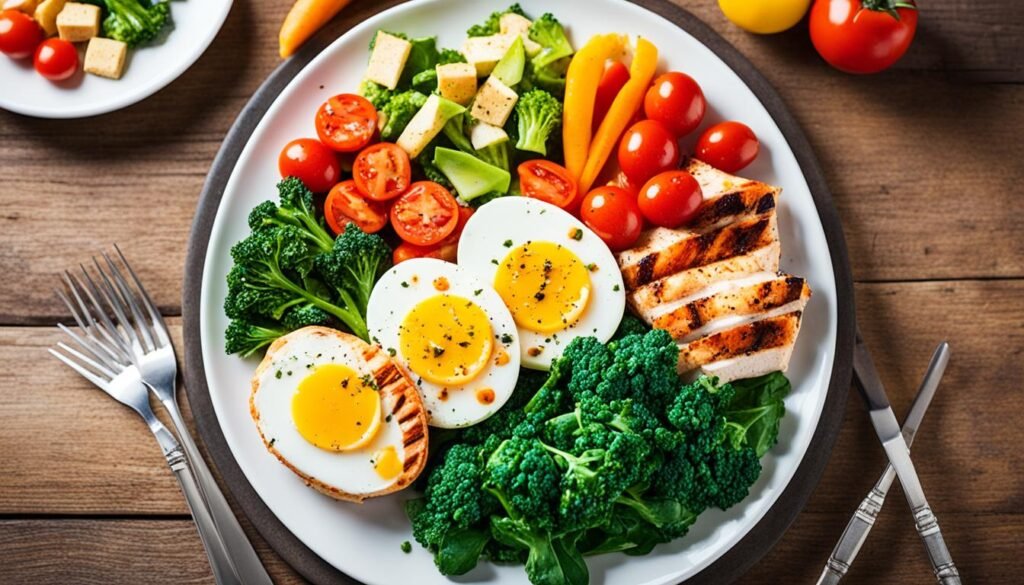A high protein diet plan can be an effective way to support weight loss. By incorporating protein-rich foods into your meals, you can increase satiety, boost metabolism, and preserve muscle mass. In addition, a high protein diet provides essential nutrients and promotes overall health. To create a successful high protein diet plan, it’s important to include a variety of protein sources, plan your meals in advance, and make sure you’re meeting your daily protein needs.
Key Takeaways:
- High protein diets can support weight loss by increasing satiety and boosting metabolism.
- Incorporating a variety of protein sources in your meals is important for a successful high protein diet plan.
- Planning meals in advance and ensuring you meet your daily protein needs are key to a high protein diet’s effectiveness.
- A high protein diet provides essential nutrients and promotes overall health.
- Consulting with a healthcare professional or registered dietitian can help you create a personalized high protein diet plan.
The Benefits of a High Protein Diet
A high protein diet offers numerous benefits for weight loss and overall health. Increasing your protein intake can support fat loss, as protein helps to promote feelings of fullness and boost metabolism. Protein is also essential for maintaining and building muscle mass, contributing to a healthy body composition.
Protein is one of the three macronutrients, along with carbohydrates and fats, that provide the body with energy and essential nutrients. Consuming adequate protein throughout the day can have several positive effects on the body:
- Helps with weight loss: Protein-rich meals can increase satiety, making you feel full for longer. This can help to reduce overall calorie intake and support fat loss.
- Preserves muscle mass: When following a high protein diet, your body is provided with the necessary amino acids to maintain and build muscle. This is important for preserving muscle mass while losing weight and promoting muscle growth when combined with resistance training exercises.
- Sustains energy levels: Protein helps to stabilize blood sugar levels, preventing energy crashes and promoting sustained energy throughout the day.
- Improves body composition: A high protein diet can help to reduce body fat and improve body composition by increasing muscle mass and reducing fat mass.
- Supports overall health: Protein is essential for various bodily functions, including immune function, hormone production, and enzyme synthesis. Consuming enough protein is crucial for optimal overall health.
Whether you follow a plant-based or animal-based diet, there are plenty of protein sources available to meet your needs. Animal-based protein sources include lean meats, poultry, fish, eggs, and dairy products. Plant-based protein sources include legumes, tofu, tempeh, seitan, nuts, and seeds. It’s important to incorporate a variety of protein sources into your diet to ensure that you’re getting all the essential amino acids your body needs.
By incorporating a high protein diet into your meal plan, you can experience the many benefits it offers for weight loss and overall health. However, it’s important to note that individual protein needs may vary, depending on factors such as age, weight, activity level, and specific health goals. Consulting with a registered dietitian can help you determine the optimal protein intake for your individual needs.
How to Increase Protein Intake
To increase your protein intake, there are several strategies you can implement into your diet. Incorporating protein-rich foods such as sprouts, beans, and lean meats can help ensure you’re getting an adequate amount of this important nutrient. It’s essential to balance your protein intake with carbohydrates and fats to meet your nutritional needs. Contrary to popular belief, a high protein diet does not cause kidney damage in individuals with healthy kidney function. Additionally, plant-based proteins can provide all the essential amino acids despite being considered incomplete compared to animal proteins.
Working with a registered dietitian is highly recommended as they can provide personalized recommendations tailored to your specific dietary needs. With their guidance, you can create a well-rounded meal plan that includes a variety of protein sources to ensure you meet your daily protein requirements.
Incorporating protein into your diet is essential for various health-related reasons, including its role in preventing muscle loss, aiding in muscle-building, and reducing overall body fat. Additionally, protein-rich foods can have a satiating effect, helping you feel fuller for longer and potentially reducing your calorie intake throughout the day.
In a systematic review and meta-analysis of randomized studies, it was found that higher protein intake, up to 1.6 grams per kilogram of body weight per day, in healthy individuals can lead to gains in muscle mass and reductions in body fat.
It is important to note that protein quality is crucial. While animal proteins are considered complete because they contain all the essential amino acids our bodies need, plant-based proteins may be considered incomplete. However, by eating a varied plant-based diet that includes different sources of protein, you can still hit your protein requirements and meet your dietary needs.
| Common Protein Myths |
|---|
| Myth: High protein diets are harmful to kidney function. |
| Fact: A high protein diet is safe for individuals with healthy kidney function and does not cause kidney damage. |
| Myth: Consuming too much protein can cause muscle loss. |
| Fact: A high protein diet can help prevent muscle loss during weight loss and support muscle gain when combined with resistance training. |
To ensure you’re getting enough protein, it’s recommended to consult with a registered dietitian who can assess your individual needs and provide guidance on meeting your protein goals. They can also help you incorporate healthy fats, such as those found in avocados and nuts, into your diet to support overall health and well-being.
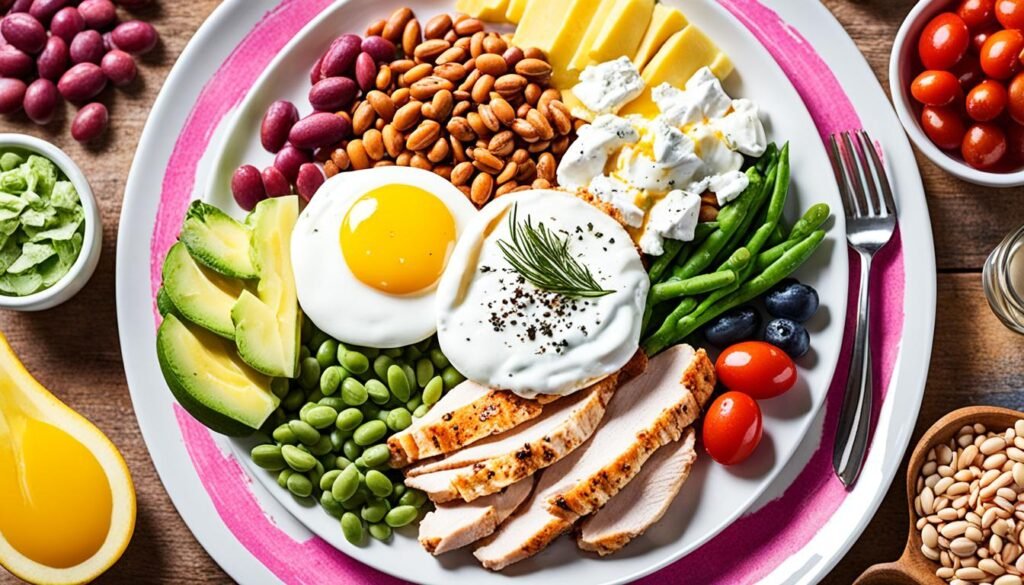
Best Sources of Protein
When following a high protein diet plan, it’s important to choose the best sources of protein. Incorporating a variety of protein-rich foods into your meals not only provides essential nutrients but also helps to keep your diet interesting. Here are some of the best protein sources to include in your high protein meal plan:
- Lean meats: Opt for lean cuts of beef, pork, and poultry, such as skinless chicken breast and sirloin steak. These meats are not only high in protein but also low in fat.
- Fish: Cold-water fish like salmon, tuna, and trout are excellent sources of protein and heart-healthy omega-3 fatty acids.
- Eggs: Eggs are a versatile and affordable protein source. They contain all essential amino acids and are a great addition to any muscle building diet plan.
- Dairy products: Milk, cheese, and yogurt are rich in protein and calcium. Look for low-fat or fat-free varieties for a healthier option.
- Legumes: Beans, lentils, and chickpeas are not only packed with protein but also high in fiber. They are an excellent choice for vegetarian or vegan individuals.
- Nuts: Almonds, peanuts, and cashews are all high in protein and healthy fats. They make for a convenient and portable protein-rich snack.
To create a balanced and protein-rich meal plan, aim to include a combination of these best protein sources. You can calculate your daily protein intake based on your weight, activity level, and goals, to ensure you’re meeting your body’s needs. Getting started with a high protein diet for weight loss or muscle gain can be easier with protein-rich meal ideas and high protein recipes that cater to your taste preferences.
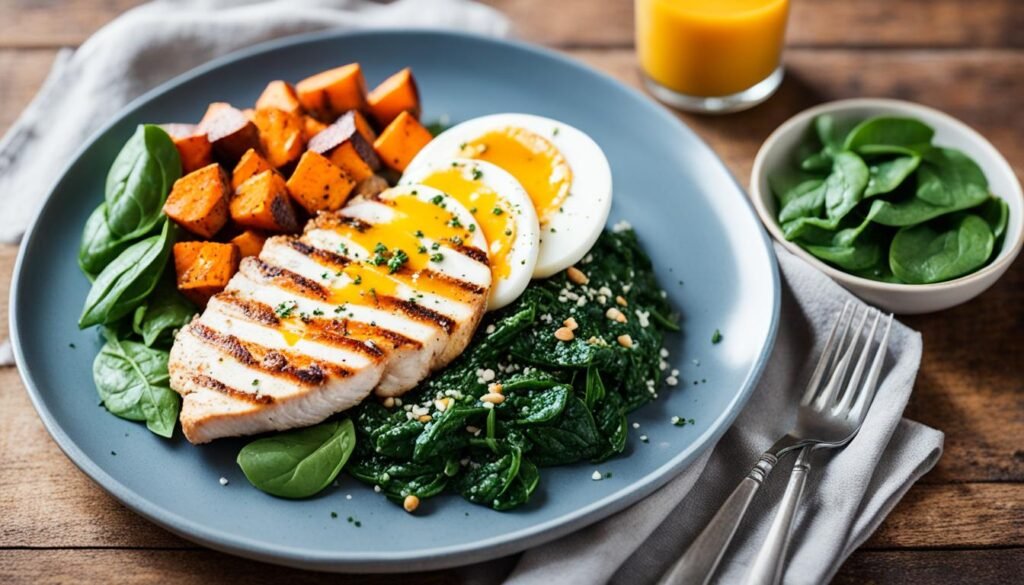
High Protein Meal Prep Ideas
Meal prepping is a game-changer when it comes to sticking to your high protein diet plan. By preparing your meals in advance, you can ensure that you have protein-packed options ready to go throughout the week. Not only does meal prepping save you time, but it also helps you make healthier choices and avoid succumbing to convenience foods that may not align with your goals.
Here are some high protein meal prep ideas to get you started:
- Grilled Chicken and Vegetables: Grill a batch of chicken breasts and roast a variety of vegetables like broccoli, bell peppers, and zucchini. Portion them into individual containers for a quick and nutritious meal on busy days.
- Egg Muffins with Spinach and Feta: Whip up a batch of egg muffins by combining eggs, spinach, feta cheese, and your favorite herbs and spices. Bake them in a muffin tin and store them in the fridge for a grab-and-go breakfast or snack option.
- Greek Yogurt with Berries and Nuts: Prepare containers with Greek yogurt, mixed berries, and a sprinkle of nuts. This protein-packed snack is not only delicious but also provides a satisfying crunch and natural sweetness.
- Protein-Packed Smoothie Bowls: Blend together your favorite combination of fruits, greens, protein powder, and a liquid of your choice. Pour the smoothie mixture into individual containers and top with nuts, seeds, and fresh fruit for a refreshing and filling meal option.
Feel free to mix and match these ideas or experiment with your own protein-packed recipes. The key is to find recipes that you enjoy and that align with your dietary preferences. With a little bit of planning and creativity, meal prepping can become a fun and convenient habit that supports your high protein diet plan.
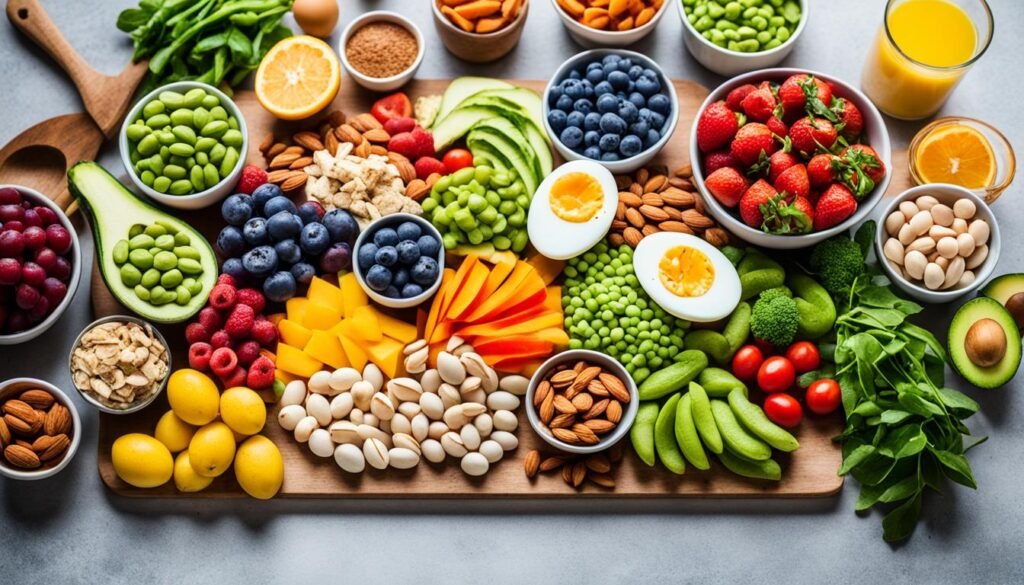
Importance of Protein in Diet for Weight Loss
Protein plays a crucial role in weight loss. When following a high protein diet, you can experience numerous benefits that can support your weight loss journey and overall health.
Benefits of a High Protein Diet
- Increased satiety: Protein-rich foods can help you feel fuller for longer, reducing the chances of overeating or snacking on unhealthy foods.
- Improved metabolism: Protein has a higher thermic effect compared to carbohydrates and fats, meaning your body burns more calories to digest and process protein-rich foods.
- Preservation of lean muscle mass: When you lose weight, there’s a risk of losing muscle mass along with fat. A high protein diet can help prevent muscle loss and promote fat loss.
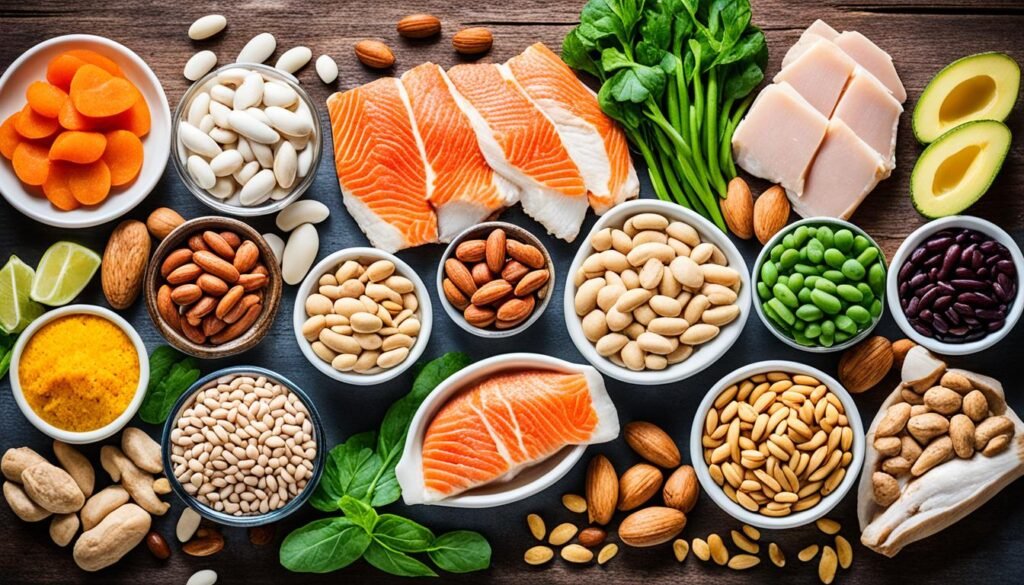
Weight Loss with a High Protein Diet
Incorporating protein-rich foods into your meals and snacks can be an effective strategy for weight loss. High protein meals and snacks can help curb cravings, reduce overall calorie intake, and support fat loss by increasing satiety and boosting metabolism.
“A diet high in protein can aid in weight loss by increasing satiety, reducing overall calorie intake, and preserving lean muscle mass.”
It’s important to create a protein-rich meal plan that includes a variety of protein sources such as lean meats, poultry, fish, eggs, dairy products, legumes, and plant-based proteins. Planning your meals in advance can help you stay consistent with your protein intake and make healthier choices.
High Protein Diet for Muscle Gain
Not only is a high protein diet beneficial for weight loss, but it can also promote muscle gain when combined with regular strength training exercises. Protein is essential for muscle repair and growth, making it an important nutrient for those looking to build and maintain muscle mass.
High Protein Diet Tips
Here are some tips for incorporating a high protein diet into your weight loss or muscle gain journey:
- Include a protein source in each meal: Aim to include lean meats, fish, poultry, eggs, or plant-based proteins in all of your meals.
- Plan your meals and snacks: By planning your meals in advance, you ensure that you have protein-rich options readily available.
- Stay consistent with your protein intake: Make sure you’re meeting your daily protein needs by tracking your intake and adjusting your portion sizes if necessary.
- Incorporate regular exercise: Combine your high protein diet with regular strength training exercises to maximize muscle gain and support weight loss.
With a well-planned high protein diet and consistent effort, you can achieve your weight loss or muscle gain goals while nourishing your body with essential nutrients.
How Much Protein Do You Need?
The amount of protein you need depends on several factors, including your weight, activity level, and goals. As a general guideline, it’s recommended to consume between 0.8 to 1 gram of protein per kilogram of body weight or 0.36 to 0.45 grams per pound. For example, a person weighing 150 pounds should aim for 54 to 68 grams of protein per day.
It’s also beneficial to distribute your protein intake evenly throughout the day and aim for a balanced amount of protein in each meal. By doing so, you can optimize protein synthesis and absorption, providing your body with a steady supply of amino acids.
Working with a nutritionist or registered dietitian can help you determine the specific protein needs for your individual goals and lifestyle. They can take into account factors such as your age, gender, activity level, and any specific dietary restrictions or preferences you may have.
Benefits of Adequate Protein Intake
- Promotes muscle growth and repair: Protein is essential for building and repairing muscle tissue, making it crucial for athletes and those who engage in regular physical activity.
- Aids in weight management: Protein helps to increase satiety, or feelings of fullness, which can lead to reduced calorie intake and support weight loss or maintenance.
- Sustains energy levels: Protein provides a source of sustained energy due to its slower digestion and stabilizing effect on blood sugar levels.
- Supports a healthy metabolism: Protein requires more energy to be digested and metabolized compared to carbohydrates and fats, resulting in a slight increase in calorie expenditure.
- Preserves lean muscle mass: Consuming adequate protein can help prevent muscle loss during periods of calorie restriction or weight loss, ensuring that the weight lost primarily comes from fat rather than muscle.
- Supports overall health: Protein is involved in various bodily functions, including enzyme production, hormone regulation, and immune system function.
By understanding your protein needs and incorporating protein-rich foods into your diet, you can optimize your health, performance, and body composition.
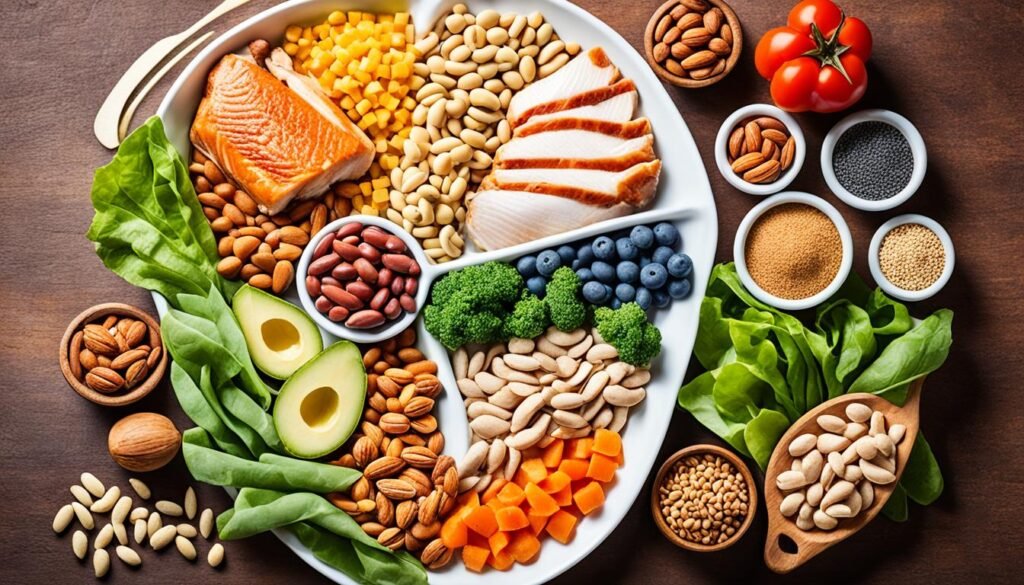
Sources of High-Quality Protein
When it comes to meeting your protein needs, it’s important to choose high-quality sources. These provide all the essential amino acids that your body needs, making them particularly beneficial for muscle growth and repair. Some examples of high-quality protein sources include:
| Animal-Based Sources | Plant-Based Sources |
|---|---|
| Lean meats (such as chicken, turkey, beef) | Legumes (such as beans, lentils, chickpeas) |
| Fish and seafood (such as salmon, tuna, shrimp) | Soy products (such as tofu, tempeh, edamame) |
| Eggs and dairy products (such as eggs, milk, yogurt, cheese) | Quinoa and other whole grains |
| Nuts and seeds (such as almonds, peanuts, chia seeds) | Seitan and other meat alternatives |
By including a variety of protein sources in your diet, you can ensure that you’re getting all the essential amino acids your body needs for optimal health and functioning.
Protein-Rich Foods for Weight Loss
Incorporating protein-rich foods into your diet can play a key role in supporting your weight loss efforts. These foods not only provide essential nutrients but also help increase satiety, boost metabolism, and promote fat loss.
Here are some protein-rich meal ideas to help you on your weight loss journey:
- Grilled chicken with roasted vegetables
- Salmon with quinoa and steamed broccoli
- Greek yogurt with berries and almonds
- Lentil soup with a side of mixed greens
These protein-packed meals are not only delicious but also help keep you feeling fuller for longer, reducing the chances of overeating or snacking on unhealthy options. By incorporating high protein foods into your meals, you can give your metabolism a natural boost and support your body’s fat-burning capabilities. Whether you prefer animal or plant-based protein sources, there are plenty of options available to suit your taste preferences and dietary needs.
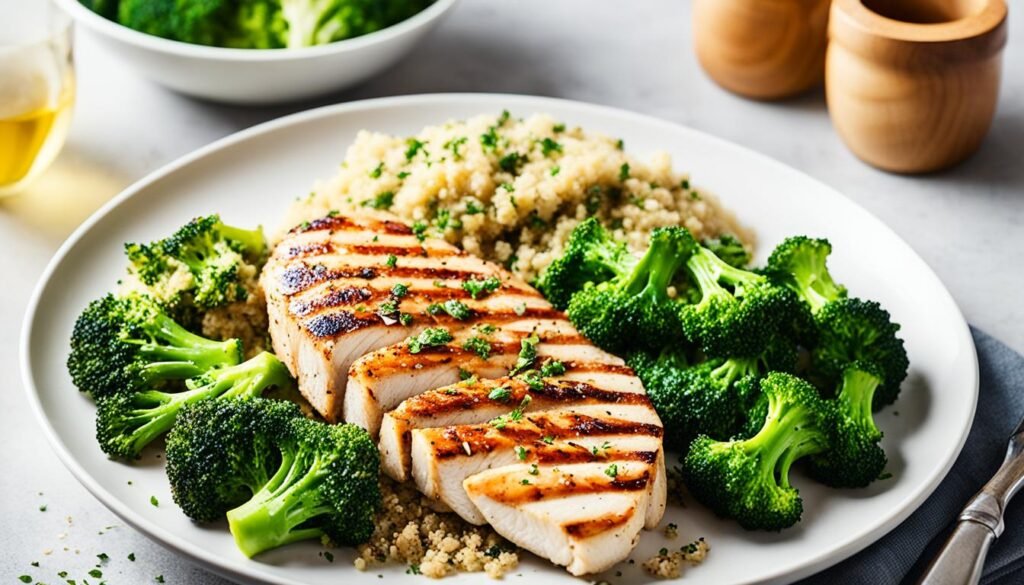
| Food | Protein Content (per serving) |
|---|---|
| Grilled Chicken Breast | 26 grams |
| Salmon | 22 grams |
| Greek Yogurt | 17 grams |
| Lentils | 18 grams |
These protein-rich meal ideas, combined with a well-rounded diet and regular exercise, can help you achieve your weight loss goals. However, it’s important to note that individual protein needs may vary, so it’s always best to consult with a healthcare professional or registered dietitian to create a personalized high protein diet plan that aligns with your specific needs and preferences.
Protein and Muscle Building
Protein is an essential nutrient that plays a crucial role in building and maintaining muscle mass. If you’re looking to increase your muscle size and strength, incorporating a higher protein intake into your diet is essential. When combined with regular strength training exercises, a high protein diet can promote muscle growth and enhance muscle recovery.
Protein is made up of amino acids, which are the building blocks of muscle tissue. When you consume protein, your body breaks it down into amino acids and uses them to repair and build muscle fibers. By providing your muscles with an adequate supply of protein, you can support the muscle-building process.
It’s important to consume protein from a variety of sources to ensure you’re getting all the essential amino acids your body needs. Some of the best sources of protein include lean meats like chicken and turkey, fatty fish like salmon and tuna, dairy products like Greek yogurt and cottage cheese, and plant-based sources like legumes, tofu, and soy products.
Proper meal prep is also crucial when it comes to building muscle. By planning and preparing high protein meals in advance, you can ensure you have protein-rich meals and snacks readily available throughout the day. This can help you meet your protein requirements and support your muscle-building goals.
| Protein-Rich Foods | Protein Content per 100g |
|---|---|
| Chicken Breast | 31g |
| Salmon | 22g |
| Greek Yogurt | 10g |
| Lentils | 9g |
| Tofu | 8g |
By combining a high protein diet with regular strength training exercises, you can optimize the muscle-building process and achieve your fitness goals. If you’re unsure about how to create a personalized high protein diet plan that aligns with your muscle-building objectives, it’s recommended to consult with a fitness professional or registered dietitian who can provide expert guidance and support.
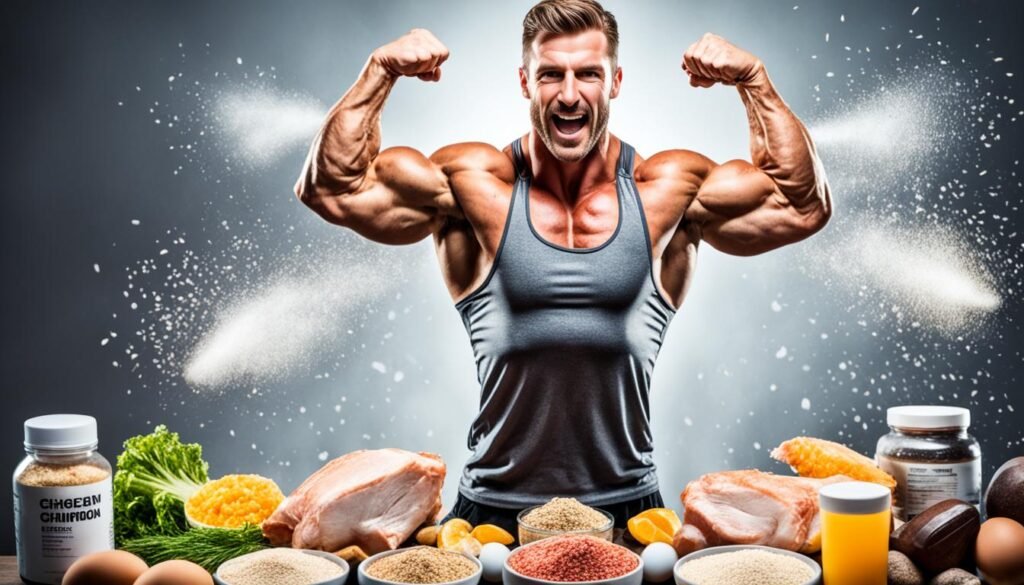
Protein and Overall Health
Protein is not only essential for weight loss and muscle building but also plays a critical role in overall health. Adequate protein intake has a positive impact on various bodily functions and can contribute to improved well-being. Let’s explore how protein affects bone health, bodyweight management, muscle loss prevention, and overall health.
Bone Health
Adequate protein intake is crucial for maintaining strong and healthy bones. Protein helps in the maintenance of bone mineral density, reducing the risk of osteoporosis and fractures. By including protein-rich foods in your diet, such as lean meats, dairy products, and legumes, you can support your bone health and protect against bone-related conditions.
Bodyweight Management
Protein plays an important role in managing bodyweight. Consuming protein-rich foods helps promote feelings of fullness, reducing appetite and preventing overeating. Additionally, protein helps preserve lean muscle mass during weight loss, ensuring that the majority of weight lost comes from fat rather than muscle. By incorporating protein into your meals and snacks, you can support healthy bodyweight management.
Muscle Loss Prevention
Protein is essential for preventing muscle loss, particularly during periods of weight loss or calorie restriction. By consuming adequate protein, you provide your body with the necessary building blocks to maintain and repair muscle tissue. This is especially important for individuals engaging in regular exercise or physical activity to maintain optimal muscle function and overall health.
Overall Health
Beyond its impact on bone health, bodyweight management, and muscle preservation, protein is involved in numerous physiological processes that contribute to overall health. Protein is necessary for enzyme production, hormone regulation, and immune function. By including protein-rich foods in your diet, you can support these vital functions and optimize your overall health and well-being.
Incorporating protein-rich foods into your meals and snacks is essential for optimizing your overall health. Don’t forget to consult with a healthcare professional or registered dietitian to create a personalized high protein diet plan that aligns with your specific goals and dietary preferences.
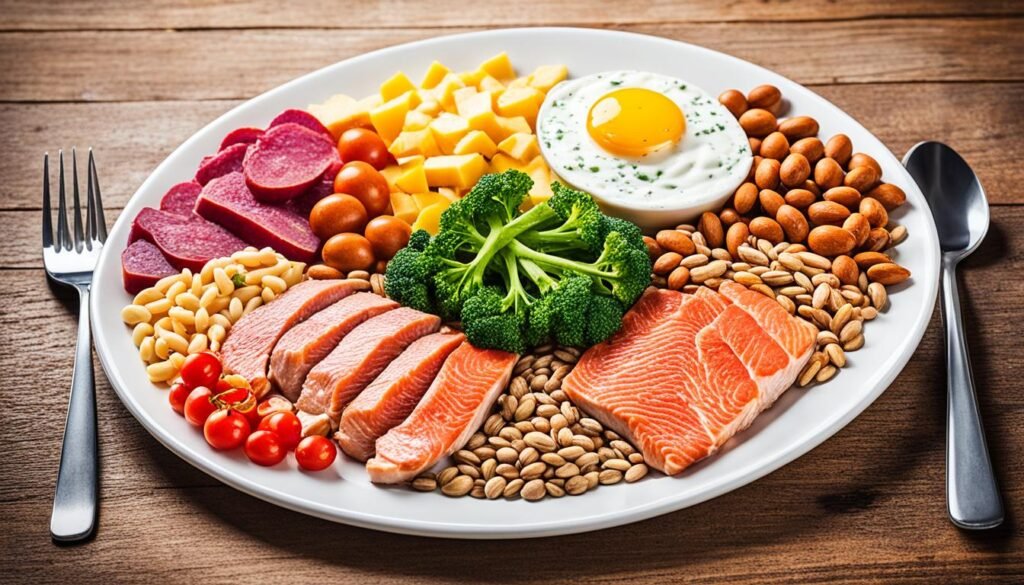
Myths about High Protein Diets
Despite their numerous benefits, high protein diets are often surrounded by myths that prevent people from fully embracing them. Let’s debunk some of these common misconceptions:
Myth #1: Eating High Protein Causes Kidney Damage
A prevalent myth suggests that consuming a high protein diet can lead to kidney damage. However, scientific research has consistently shown that a high protein diet does not pose any harm to the kidneys in individuals with healthy kidney function[1]. It is important to understand that there’s no need to worry about consuming adequate protein to support your health and fitness goals.
Myth #2: High Protein Diets Cause Muscle Loss
Another myth surrounding high protein diets is the idea that they can lead to muscle loss. On the contrary, eating a high protein diet can actually help prevent muscle loss during weight loss efforts and promote muscle gain when combined with resistance training[2]. Adequate protein intake is crucial for preserving and building muscle mass, making it an essential component of any effective fitness regimen.
Also Read : Benefits of a Chicken and Rice Diet Plan
“Dispelling the myths surrounding high protein diets is important to help people realize the benefits they can offer for weight loss and muscle preservation.”
By understanding the science behind high protein diets and dispelling these myths, individuals can take full advantage of the benefits these diets provide for weight loss, muscle preservation, and overall health.
References:
- Levey AS, et al. (2004) A more accurate method to estimate glomerular filtration rate from serum creatinine: a new prediction equation. Ann Intern Med. 141(9): 929-37.
- Helms ER, et al. (2014) Evidence-based recommendations for natural bodybuilding contest preparation: nutrition and supplementation. J Int Soc Sports Nutr. 11: 20.
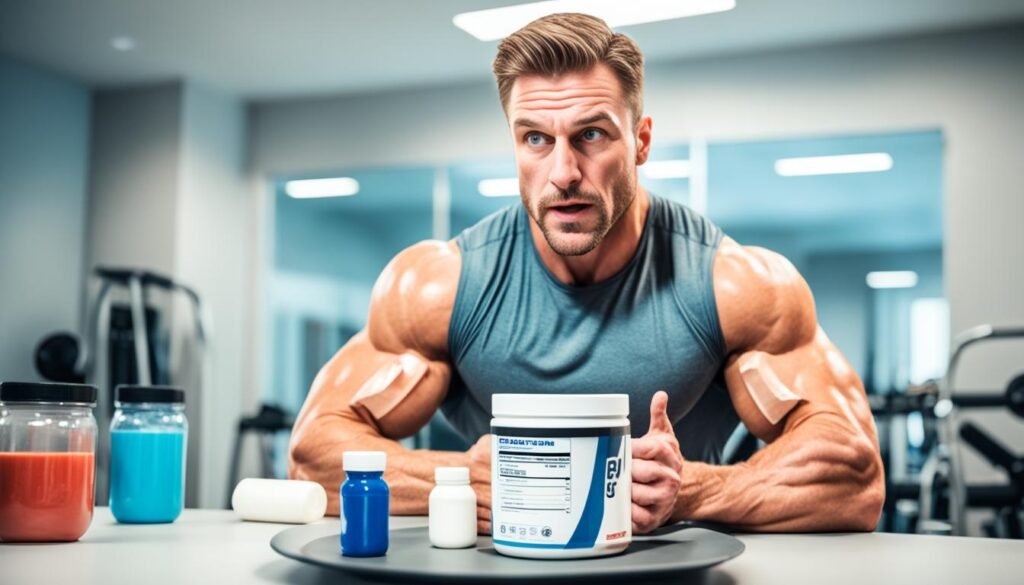
Conclusion
A high protein diet plan can be an effective strategy for weight loss and overall health. Incorporating protein-rich foods into your meals and snacks can have numerous benefits, including increased satiety, a boosted metabolism, and the preservation of muscle mass. For optimal results, it’s important to choose high-quality protein sources, plan your meals in advance, and meet your daily protein needs.
To create a personalized high protein diet plan that aligns with your specific goals and dietary preferences, it’s recommended to consult with a healthcare professional or registered dietitian. They can provide expert guidance and help you develop a plan that works best for you. Remember to be consistent with your protein intake and combine it with regular exercise to optimize your results.
A high protein diet plan not only supports weight loss but also promotes overall health. Protein plays a vital role in various bodily functions, such as muscle repair, immune function, and hormone regulation. By prioritizing protein-rich foods in your diet, you can improve your body composition, support bone health, and enhance your overall well-being.
Incorporating a high protein diet into your lifestyle requires careful planning and consideration of your individual needs. By following a well-rounded high protein diet plan, you can achieve your weight loss goals and improve your overall health for the long term.
FAQ
Q: What is a high protein diet plan?
A: A high protein diet plan is a meal plan that emphasizes consuming a higher amount of protein compared to carbohydrates and fats. This type of diet is often used for effective weight loss and muscle building.
Q: How can I create a high-protein meal plan?
A: To create a high-protein meal plan, focus on incorporating lean proteins such as chicken, fish, tofu, and legumes into your meals. Include a variety of vegetables and whole grains to ensure a balanced diet.
Q: Is a plant-based high-protein meal plan effective for weight loss?
A: Yes, a plant-based high-protein meal plan can be effective for weight loss. By including plant-based proteins like beans, lentils, quinoa, and nuts, you can meet your protein needs while following a vegetarian or vegan diet.
Q: How do I calculate my protein intake per pound of body weight?
A: To calculate your protein intake per pound of body weight, multiply your weight in pounds by the recommended daily allowance (RDA) for protein, which is typically around 0.36 grams per pound of body weight.
Q: What are the effects of consuming high levels of dietary protein?
A: Consuming high levels of dietary protein can help reduce appetite, increase metabolism, and support muscle growth and repair. However, it’s important to balance protein intake with carbohydrates and fats for overall health.
Q: Can a high-protein diet plan help with weight loss on a ketogenic (keto) diet?
A: Yes, a high-protein diet plan can be compatible with a ketogenic (keto) diet for weight loss. By focusing on protein-rich foods and minimizing carbohydrate intake, you can achieve ketosis and promote fat loss.
Q: How many calories should I aim for in a high-protein meal plan?
A: The recommended dietary allowance (RDA) for protein is around 56 grams per day for men and 46 grams per day for women. By including protein-rich foods in your meals, you can meet your protein needs while managing your calorie intake.
